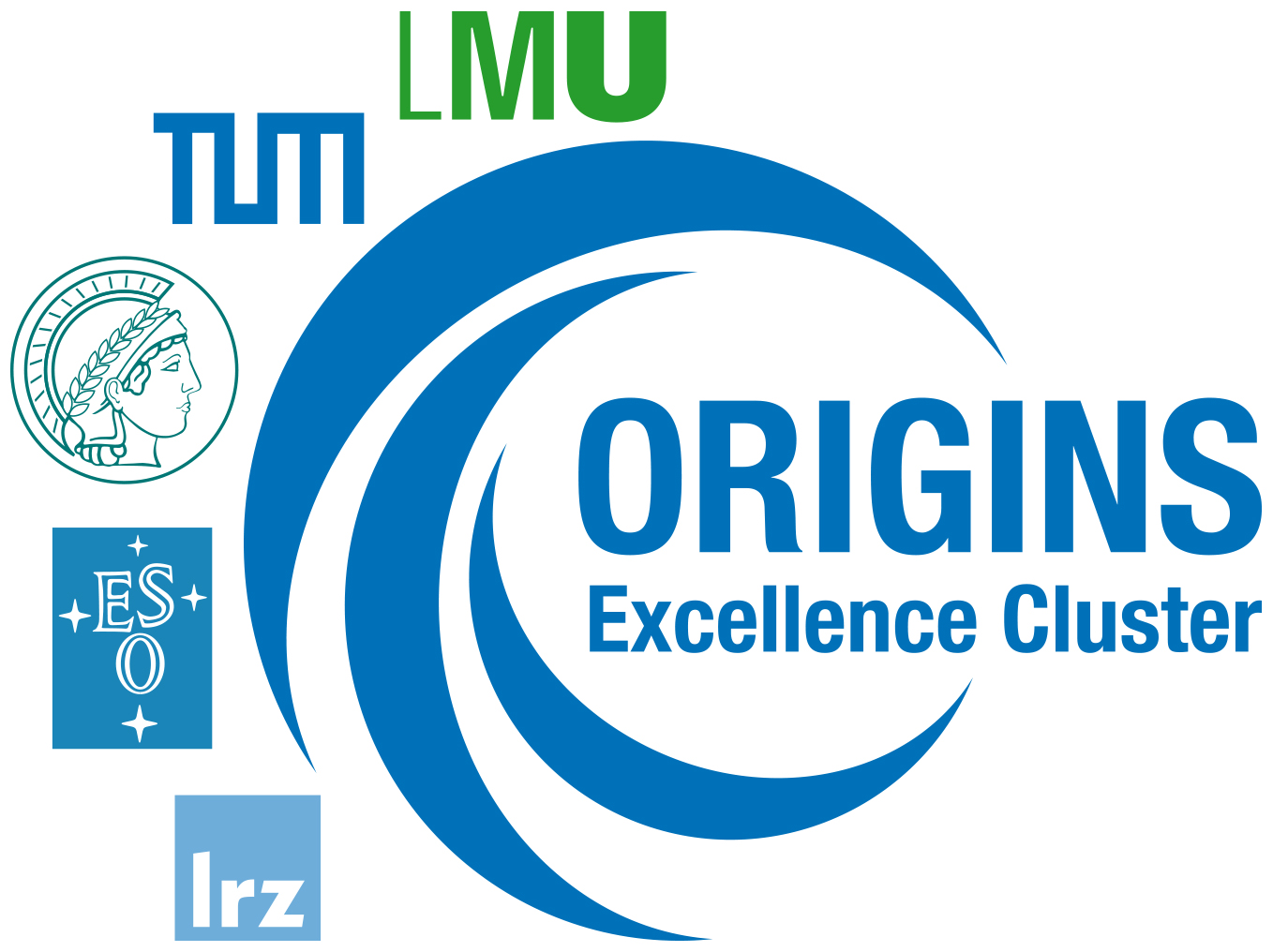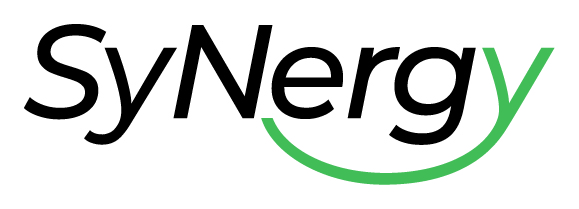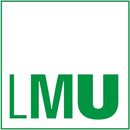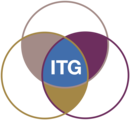Institutional Members
Funding institutional members provide the OSC with a yearly membership fee to get priority in our training programmes and consultations
Cluster of Excellence: Origins
The Excellence Cluster ORIGINS: “From the Origins of the Universe to the First Building Blocks of Life” is an interdisciplinary research network based in Munich and Garching. Building on the previous Excellence Cluster Universe, a very fruitful collaboration between astro-, particle- and nuclear physicists, ORIGINS is exploring the conjecture of modern cosmology that the Universe and the emergence of life have naturally unfolded from the initial conditions laid out in the Big Bang. Open Science under FAIR (Findability, Accessibility, Interoperability, and Reuse of digital assets) principles has a long tradition in astrophysics and is showing increased activity in particle physics. The ORIGINS Data Science Lab (ODSL) was founded as a pillar for novel statistical data analysis and artificial intelligence in all ORIGINS (bio-)physics and chemistry disciplines. As a part of ODSL, the Dark Matter Data Centre (DMDC) provides an open science repository for dark matter-related experimental data, numerical simulations and related software to improve accessibility within the dark matter community.
Contact Person: Prof. Dr. Thomas Kuhr
Cluster of Excellence: SyNergy
The Munich Cluster for Systems Neurology (SyNergy) investigates how complex neurological diseases such as Alzheimer's disease, stroke, and multiple sclerosis develop. Using systems neurology as a new interdisciplinary approach, researchers can decipher the shared disease mechanisms of neurovascular, neurodegenerative, and neuroimmunological diseases and on this basis develop novel diagnostic and therapeutic approaches. SyNergy has expressed its commitment to promoting research transparency and reproducibility in both quantitative and qualitative research endeavors. We view the ability to replicate and reproduce research findings, whether quantitative or qualitative, as fundamental pillars supporting the generalizability and reliability of scientific knowledge.
Contact person: Prof. Dr. Martin Dichgans
Department Psychology
Psychological science has seen a substantial replication crisis in the last years, with many large scale projects failing to replicate apparently well established findings. With the goal to increase the awareness and the adoption of open science practices, in July 2015 an Open Science Committee was established at the Department Psychology. Its project on the Open Science Framework (OSF) provides different documents and presentations that are used in research and teaching. Furthermore, since 2016 all job descriptions for professorship positions at our department included an "Open Science track record" as desirable characteristic of an applicant. Additionally, we decided to require a PhD/Dissertation agreement between all PhD students and their supervisors that includes planned open science practices. A template for this kind of agreement is provided on our website.
Contact Person: Prof. Dr. Felix Schönbrodt
Faculty of Business Administration - Munich School of Management
“The LMU Munich School of Management is committed to advancing the principles of open science and research transparency. By becoming an institutional member of the LMU's Open Science Center, we aim to foster a culture of openness, collaboration, and integrity in our research community. We believe that promoting open access to data, methodologies, and findings will enhance the quality and reproducibility of research in business studies, ultimately contributing to innovative and impactful solutions for global business challenges.”
Contact person: Prof. Dr. Ralf Elsas
Affiliated members share the goals of the OSC and provide support in kind (e.g. infrastructure, services, collaborations)
BMC
The Biomedical Center Munich (BMC) is striving to enhance the quality and reproducibility of its research through the adoption of Open Science practices. With a focus on improving experimental design, documentation, and data management, BMC aims to adhere to FAIR principles (Findable, Accessible, Interoperable, Re-usable). Initial efforts include raising awareness among researchers, training in doctoral programs, and evaluating the effectiveness of these measures. Current activities involve participation in Responsible Research Days and integration of Open Science concepts into doctoral programs. Looking ahead, BMC plans to implement Open Science practices institute-wide over the next five years, including creating guidelines and checklists for researchers. Collaboration with other biomedical institutes and the Open Science Center (OSC) is key to sharing experiences and fostering a campus-wide Open Science initiative. [more]
Contact Person: Dr. Tobias Straub
Department Statistics
The LMU department of statistics supports the goals of the OSC and wants to take on a leading role in fostering good research practices and promoting open science. We believe that statistics as a subject plays a major role in solving the reproducibility crisis and in working towards better, open research.
Digital Humanities Center - IT-Gruppe Geisteswisssenschaften
The IT-Gruppe Geisteswissenschaften is a Digital Humanities Competence- and Datacenter. It provides IT-infrastructure, plans, organizes and implements digital research & education. It also supports research data management services in cooperation with the Universitätsbibliothek (Open Access LMU und Open Data LMU). The ITG is committed to Open Access and FAIR data principles to ensure a maximum of availability, transparency, verifiability and sustainability of research software (including data, results, code). Activities in the context of open science are well documented by various DH-projects (www.itg.lmu.de/projects). Good examples are VerbaAlpina (https://www.verba-alpina.gwi.uni-muenchen.de: geolinguistics, research data, methodology), KiT (http://www.kit.gwi.uni-muenchen.de: innovative publication in the context of corpus linguistics) or DHVLab (https://dhvlab.gwi.uni-muenchen.de: digital research and teaching infrastructure for the humanities).
Contact person: Dr. Stephan Lücke
Faculty of Psychology and Educational Sciences
The fostering of research transparency and reproducibility, both in quantitative and qualitative research, is a stated goal of the Faculty of Psychology and Educational Science. We consider replicability and reproducibility of quantitative and qualitative research results as cornerstones of generalizability and reliability in science.
Contact Person: Prof. Dr. Felix Schönbrodt
Faculty of Veterinary Medicine
LMU-ifo Economics & Business Data Center (EBDC)
Scientific integrity is a core principle every researcher has to live up to every day. The LMU-ifo Economics & Business Data Center (EBDC), the joint research data center of the ifo Institute and the LMU Munich, supports students and researchers from Munich and beyond with this task. We, the EBDC team, offer guidance and courses on good scientific practices and research data management. In addition, researchers have the opportunity to archive their research data at EBDC and make it available for replication and secondary research projects in several ways. Furthermore in our accredited research data center, local and visiting researchers have the possibility to work in a secure, well-equipped and supervised environment with sensitive, access-restricted data sets either from external data holders or the ifo firm data. The cooperation with the Research Data Center of the Federal Statistical Office also makes it possible to access research data sets from German official statistics.
Contact person: Dr. Sebastian Wichert
LRZ
The Leibniz-Rechenzentrum supports the work of the LMU-OSC by providing infrastructures related to open science practices.
Medical Faculty
We are committed to the principles of good scientific practice as we consider replicability to be of utmost importance in both basic and translational research. As one of our Open Science initiatives, our Department of Radiation Oncology has established Radiation Oncology, a successful peer-reviewed Open Access journal which has already become one of the respected journals in its field (2015 journal impact factor 2.5).
Contact person: Gunther Löfflmann
Munich Center for Neurosciences - Brain & Mind
The Munich Center for Neurosciences - Brain & Mind (MCN-LMU) and its teaching entity - the Graduate School of Systemic Neurosciences (GSN-LMU) - aim to link local research groups from all areas of the neurosciences. Through creating an interdisciplinary network of excellent research with strong international connections, MCN and GSN provide a stimulating environment for students and faculty to produce novel formulations of current concepts and theories.
Since 2005, MCN and GSN have become the hub for neuroscience research and education in the Munich area. Our commitment to excellence sets high standards for researchers, who strive for quality and replicability.
The Scientific Boards of MCN and GSN have long supported courses and events on responsible science and good scientific practice. At the institutional level, the most recent commitment to the LMU open science initiative will be enhanced by outreach and interdisciplinary dialogue, engaging GSN’s 147 faculty, more than 220 current students, as well as over 230 alumni, and 100 MCN members, respectively. Long-standing routines such as the Thesis Advisory Committees (TAC) for all doctoral researchers complement any further actions toward scientific integrity.
Contact person: Raluca Goron
Universitätsbibliothek
The University Library supports Open Access and Open Science and offers a variety of related services for all LMU faculties.









